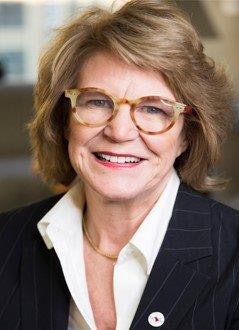As Katherine “Shelley” Broderick prepares to step down this summer as dean of the University of the District of Columbia (UDC) David A. Clarke School of Law, she reflects on her law career that began more than 40 years ago.
There were two defining moments in her life that pushed her to become a lawyer. After her brother was wounded in the Vietnam War, she became outraged and believed that legislators and lawyers needed to push for change. Second, she was heavily influenced by the Civil Rights Movement and Dr. Martin Luther King, Jr.
 Katherine “Shelley” Broderick
Katherine “Shelley” Broderick“I was in high school when MLK and Robert Kennedy were assassinated,” Broderick said in an interview with Diverse. “I heard MLK speak when I was 11 years old in Boston and it touched me deeply. I also saw that lawyers and the Justice Department were deeply involved in changing the way that we behave in this country.”
From a small fisherman’s village in Maine, Broderick moved to Boston with her family at the age of 11. Four years later, her family moved to Manhattan. Following in her sister’s footsteps, Broderick decided to move to Washington D.C. and eventually chose to attend American University.
“I chose Washington for college because I thought that’s where change could happen,” she said. “I loved the city, I loved politics and I cared about changing the way we do business in this country. I drank the Kool-Aid and never left.”
During her time at American and a few years after, Broderick worked with inmates who were within six months of release at a halfway house and then at a local prison in D.C. Broderick’s experience with the inmates inspired her to become a criminal defense lawyer.
“I was again morally outraged at the waste of human beings we locked up, doing 20 years to life for crimes that did not deserve that kind of time,” Broderick said. “I couldn’t help but notice that 100 percent of the people locked up in the D.C. prison were African-American. I decided to go to law school to try and keep people out of jail.”
Broderick knew that she wanted to teach and actively sought out fellowships and clinical programs. She eventually was selected for a fellowship program at Antioch School of Law, working at a consumer rights clinic.
Eight months into her fellowship, she took over the criminal defense clinic, which she led for 10 years. After Antioch decided to close its law school in 1986, Broderick and others went down to city hall to fight for it to remain open.
“In our 16 years of existence in Washington, D.C., [Antioch] represented 19,000 low-income residents through the schoo’s legal clinics,” said Broderick. “There was no public law schools, there was just some very expensive private schools. We said you should take this over and make it a public law school and they did. In 1996, we officially merged with the District of Columbia law school.”
Throughout her career, Broderick had seen D.C. develop from a “sleepy southern town” to a “world-class international city.” However, she still wants to see D.C. obtain voting rights and become a democracy. In 2016, D.C. Mayor Muriel Bowser asked Broderick to serve on her legal team to draft a new constitution for the statehood of D.C.
“Hillary Clinton had agreed to approve statehood for the district if she had become president,” said Broderick. “We really thought we would have had a shot at it. [D.C.] urgently needs voting rights in Congress. We have a congressional delegate who has no vote.”
She has received many awards and accolades throughout her career, including the Thurgood Marshall Scholarship Fund’s “Educational Leadership Award” in 2016 and the National Bar Association’s “Heman Sweatt Award” in 2017.
Additionally, among many other accomplishments at UDC, she secured the highest level of American Bar Association accreditation and forged the first Memorandum of Understanding between the University of Havana and any American law school. Broderick has traveled around the world to learn more about other countries’ legal systems.
“I’ve been fortunate that I’ve had the opportunity to participate in law delegations in South Africa, Cuba, Israel, China, India and now Vietnam,” she said. “I’ve learned an amazing amount about what’s good about our system and what’s not. I think that it’s beneficial to understand other models and that we are not the only model that works.”
Broderick made the decision to step down as dean this year and will be taking a one-year sabbatical before returning to UDC as a faculty member. In January, she will be leading a law delegation in Vietnam and Cambodia with many alumni and friends.
“As I’m stepping down from the deanship, people have been incredibly generous in honoring me,” Broderick said. “The thing that I’m proudest of is our alumni. Every place I go, I run into our alumni, hear from them or hear about them. They are succeeding, achieving and carrying on the mission of this law school. That makes my heart sing.”
This is the first in a series of stories about Law School deans. This article appeared in the July 12, 2018 issue of Diverse.


















